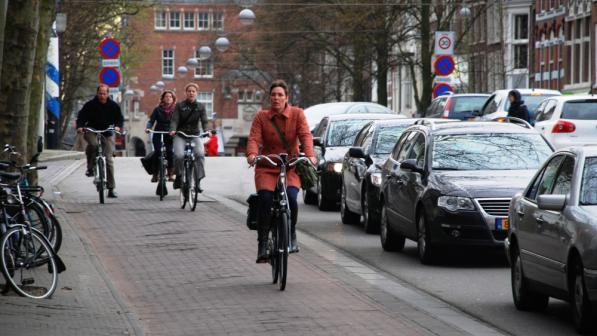Proof that better cycle infrastructure dramatically increases cycle use

A recent study in the Preventive Medicine journal has found that improvements to cycle infrastructure account for 85% of increased cycle use.
The study, conducted by academics at Cambridge University, took the Cambridgeshire Guided Busway as a case-study. The aim was to understand mechanisms linking changes to the environment with changes in physical activity, which, the study said, were “poorly understood”.
The study was conducted using a sample of roughly 1000 people, from a variety of demographics, who lived within 30km of the city centre and travelled to workplaces in Cambridge along the busway route. Data was collected from the participants over three years, from 2009-2012. The busway opened in 2011.
The data examined people’s travel habits, perceptions of different modes of transport and theory of planned behaviour. It found that exposure to the busway was positively associated with an increase in cycling – with 85% of the reported increase in cycle use being attributed to use of the cycle path only.
The researchers concluded: “The findings strengthen the causal argument that changing the environment led to changes in health-related behaviour via use of the new infrastructure”.
It may seem obvious that improved cycle infrastructure equals increased cycle use. However, the extent to which this is true had never been academically quantified. The findings give a clear message to the Department for Transport: if David Cameron wants to realise his “cycling revolution”, there is no more effective way than committing meaningful investment into cycle friendly infrastructure.
The findings give a clear message to the Department for Transport: if David Cameron wants to realise his “cycling revolution”, there is no more effective way than committing meaningful investment into cycle friendly infrastructure.
Tom Guha, Cycling UK Space for Cycling campaigner
The benefits of cycling are well known. Just last week, the World Health Organisation published a report advocating active travel as a means of reducing rates of diabetes.
Cycling can also help in the fight against global climate change and local pollution. In the EU, transport accounts for 20% of carbon emissions. If every country were to achieve Danish levels of cycling, this alone would account for between 5-11% of the emissions reductions required to reach the EU’s official 2020 targets.
Perhaps less obvious is the benefit of active travel to local economies. Compared to cars, cyclists generally stop more frequently, travel fewer miles and have less capacity to carry lots of bags – meaning they naturally gravitate towards smaller, locally owned shops.
Currently the Government has committed just £300 million to cycling and walking for the next 5 years. That’s an annual figure of £1.39 per head for those not living in London, whereas in London it's nearly £18 per head for 2015/16. By comparison, £15 billion is dedicated for road-building over the same period. Diverting funds from this, and the soon to be introduced Sugar Tax, will provide the funding for cycling the Prime Minister needs to keep his promise of achieving at least £10 per head for cycling.
We are continuing along a trajectory towards a high-carbon, low-active travel transport system. The Government has expressed a commitment to reducing obesity in the UK, to combating climate change and to reducing air pollution.
All the evidence is stacked up in favour of improving cycle infrastructure, and Cycling UK will continue campaigning until we have Space for Cycling for everyone, not just a few cities.
Tell your Councillors to support Space for Cycling. And don’t forget to Vote Bike if you have elections this May.
